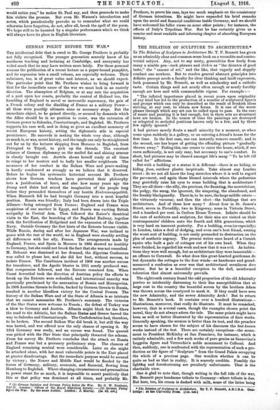GERMAN POLICY BEFORE THE WAR..*
THE intellectual debt that is owed to Mr. George Prothero is probably not fully recognized. The younger generation scarcely know of his assiduous teaching and lecturing at Cambridge, and anonymity has veiled much that he may have written more lately. For these personal reasons the publication of a recent lecture as a paper-bound pamphlet, and its expansion into a small volume, are especially welcome. Their substance, too, is of great value and interest, as we should expect. The particular point that Mr. Prothero wishes to bring forward is that for the immediate cause of the war we must look in an easterly direction. The absorption of Belgium, or at any rate the acquisition of a port upon her coasts, probably the control of Holland too, the humbling of England in naval or mercantile supremacy, the gain of a French colony and the disabling of France as a military Power— all these were possibly ultimate aims or necessary steps. But the immediate object, to be gained directly, or secured by demands which the Allies should be in no position to resist, was the extension of German power to Salonika, Constantinople, and Baghdad. Mr. Prothero supports his case well, and in doing so gives an excellent summary of recent European history, setting the diplomatic side in especial prominence. He succeeds in making the whole very clear, although so much is, or was, secret history, and the tangle can only be straightened out for us by the lecturer skipping from Morocco to Baghdad, from Petrograd to Tripoli, to pick up the threads. The constant reliance of German diplomacy on the mailed fist and shining armour is clearly brought out. Austria shows herself ready at all times to cringe to her masters and to bully her smaller neighbours. The meanness of her conduct in the Balkan Wars and peace-making is hardly condemned as strongly as we believe that it deserved. Before he begins his systematic historical account Mr. Prothero shows how German teachers have perverted their philosophy into a justification of force, and also how many years ago the Drang nach Osten had seized the imagination of the people long before they persuaded themselves of any hostile Einkreisungspolitik. When Bismarck fell he had brought Germany into a most hopeful position. Russia was friendly ; Italy had been drawn into the Triple Alliance—being estranged from France ; England and France were suspicious of one another in Egypt, and Russia was exciting British antipathy in Central Asia. Then followed the Kaiser's theatrical visite to the East, the launching of the Baghdad Railway, together with the fortification of Heligoland and the expansion of the German Navy. Outside Germany the first hints of the Entente became visible. While Russia, during and after her Japanese War, was inclined to peace with the rest of the world, we in England were steadily settling all differences with her ally, France. The arrangements made by England, France, and Spain in Morocco in 1904 showed no hostility to Germany, but she could not brook the fact that she was not consulted. AL Deleasse was dismissed at her demand, the Algeciras Conference was called to please her, and she did her best, without success, to isolate France. The Casablanca incident of 1908 was another excuse for truculence, and the Agadir bluster in 1911 nearly produced war. But compromise followed, and the Entente remained firm. When Count Aeronthal took the direction of Austrian policy the efforts to break up the Entente were redoubled, and international anarchy was practically proclaimed by the annexation of Bosnia and Herzegovina. In 1908 Austrian threats to Serbia, backed by German threats to Russia, resulted in another bloodless victory for the Central Powers. The history of the Balkan Wars and of the State of Albania is so intricate that we cannot summarize Mr. Prothero's summary. The victories of the Slav States wore welcome to Russia ; the defeat of Turkey was a blow to Germany and Austria. Albania might block for the Slays the road to the Adriatic, but the Balkan States and Greece barred the way to Salonika and Constantinople. The Confederation had, therefore, to be broken. The second Balkan War did break it, but still the way was barred, and war offered now the only chance of opening it. By 1914 Germany was ready, and an excuse was found. The quarrel was picked with the Slav State that principally thwarted the scheme. From his survey Mr. Prothero concludes that the attack on Russia and France was but a necessary preliminary step. The chances of England remaining neutral were considerable. Later on she might bo attacked alone, with her most vulnerable points in the East placed at greater disadvantage. But the immediate purpose would be secured by victory ; the Nearer and Middle East would be flooded by the forces of Germany, military, economic, and financial, flowing from Hamburg to Baghdad. Where changing circumstances and personalities in power count for so much, it is impossible to assert positively that this or that policy was dominant at all times, and probably Mr.
• (1 t.D) German Opinion and German Policy before the War. By G. W. Prothero, Lg. . London : Claims of the Royal Historical goclety.—(2) German Policy Wore the. Wai. By the same Author. London : J. Murray. (2s. 6d. net.]
Prothero, to prove his case, lays too much emphasis on the consistency of German intentions. He might have expanded his brief remarks upon the social and financial conditions inside Germany, and we should have welcomed his fuller views on some other points ; for instance, the effects of Italy's Tripolitan War. But he has certainly given us a concise and most readable and informing chapter of absorbing European history.






























 Previous page
Previous page